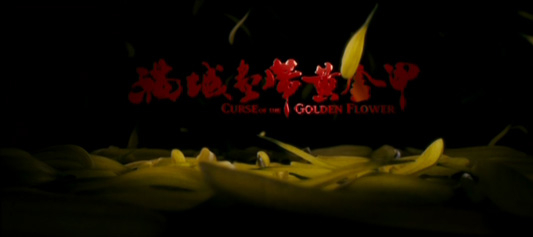
Fifth Generation director Zhang Yimou’s latest film, Curse of the Golden Flower (满城尽带黄金甲), is the most expensive production in the history of the Chinese film industry. The budget, reportedly $45 million ($10 million more than the previous Chinese record-breaker, though less than half the cost of Titanic), was spent on recreating the opulence of 10th century China. Every surface of the imperial palace shimmers with iridescent decorations. The splendor of the film’s production design is matched by the gravitas of its superb cast, led by Chow Yun-Fat and Gong Li, two superstars of Asian cinema.
Emperor Ping is slowly poisoning his consort Phoenix, the Empress, whom he married not for love but for power (as she is the previous Emperor’s daughter). The Empress seeks solace in the arms of her stepson Wan, the Crown Prince, and plots to avenge her husband’s cruelty. She confides in Wan’s brother, Prince Jai, who promises to lead an army of 10,000 soldiers in a coup against the Emperor.
Exactly why the Emperor is poisoning his consort’s medication is never made clear, though we can infer that it’s a punishment for her (almost) incestuous infidelity. Though the Empress is aware of the poisoning, she is unable to stop it, as her medication is administered with clockwork regularity and scrutinised meticulously. We may marvel at the formal precision of decadent, ritualised palace life, though the stifling constraints of protocol are also self-evident.
The plotting and counter-plotting within the palace walls are Shakespearean in their machinations and repercussions, while the ensuing battle (between troops loyal to the Empress, led by Prince Yai, versus those of the Emperor) is operatic in scale. In these aspects, the film has echoes of Ran (乱), Akira Kurosawa’s samurai interpretation of King Lear.
The Emperor is portrayed as a power-crazed, cruel, and heartless man, though his consort’s is rather more complex. Restrained and symbolically imprisoned by her imperial position, she is a sympathetic character. However, her affair with her stepson and her relish at a devastating revelation she orchestrates suggest that she is not completely innocent herself. Their youngest son, Prince Yu, demonstrates a selfish ambition beneath his placid exterior, and eldest son Prince Wan’s actions are ruled by his loins rather than his head. In contrast, the principled middle son, Prince Yai, is the film’s hero.
The outcomes of the Emperor’s and Empress’s actions culminate in bloodshed on both an epic and intimate scale. Yet, despite a series of personal tragedies, the dynasty does not unravel, and imperial power is unassailable; the blood from the battle is (literally and metaphorically) swept under the carpet.
Despite a sword-fighting scene and the aforementioned battle sequence, this is not a martial-arts film in the same vein as Zhang’s earlier mega-budget (dapian) productions Hero (英雄) or House of Flying Daggers (十面埋伏). It marks a reunion between the director and his muse, Gong Li: she starred in several of his early films, and they had a long-lasting affair, though they separated personally and professionally in 1995.
Emperor Ping is slowly poisoning his consort Phoenix, the Empress, whom he married not for love but for power (as she is the previous Emperor’s daughter). The Empress seeks solace in the arms of her stepson Wan, the Crown Prince, and plots to avenge her husband’s cruelty. She confides in Wan’s brother, Prince Jai, who promises to lead an army of 10,000 soldiers in a coup against the Emperor.
Exactly why the Emperor is poisoning his consort’s medication is never made clear, though we can infer that it’s a punishment for her (almost) incestuous infidelity. Though the Empress is aware of the poisoning, she is unable to stop it, as her medication is administered with clockwork regularity and scrutinised meticulously. We may marvel at the formal precision of decadent, ritualised palace life, though the stifling constraints of protocol are also self-evident.
The plotting and counter-plotting within the palace walls are Shakespearean in their machinations and repercussions, while the ensuing battle (between troops loyal to the Empress, led by Prince Yai, versus those of the Emperor) is operatic in scale. In these aspects, the film has echoes of Ran (乱), Akira Kurosawa’s samurai interpretation of King Lear.
The Emperor is portrayed as a power-crazed, cruel, and heartless man, though his consort’s is rather more complex. Restrained and symbolically imprisoned by her imperial position, she is a sympathetic character. However, her affair with her stepson and her relish at a devastating revelation she orchestrates suggest that she is not completely innocent herself. Their youngest son, Prince Yu, demonstrates a selfish ambition beneath his placid exterior, and eldest son Prince Wan’s actions are ruled by his loins rather than his head. In contrast, the principled middle son, Prince Yai, is the film’s hero.
The outcomes of the Emperor’s and Empress’s actions culminate in bloodshed on both an epic and intimate scale. Yet, despite a series of personal tragedies, the dynasty does not unravel, and imperial power is unassailable; the blood from the battle is (literally and metaphorically) swept under the carpet.
Despite a sword-fighting scene and the aforementioned battle sequence, this is not a martial-arts film in the same vein as Zhang’s earlier mega-budget (dapian) productions Hero (英雄) or House of Flying Daggers (十面埋伏). It marks a reunion between the director and his muse, Gong Li: she starred in several of his early films, and they had a long-lasting affair, though they separated personally and professionally in 1995.
